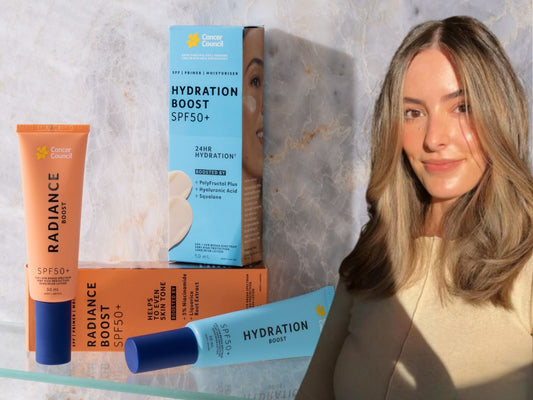2024 was a seemingly endless onslaught of plumping lip gloss and peptide lip balm launches, all promising to give you fuller lips. Some painlessly, some not so much, but are we missing the point?
Let’s talk about why your lips might not look as full and juicy as they used to, how these treatments work and why your daytime lip combo should prioritise sunscreen.
The skin on our lips differs from the face in a few ways. The uppermost layer - the epidermis - is thinner, meaning the all-important moisture barrier isn’t as robust. There are no sweat or oil glands in the lips for lubrication, either, and consequently, the skin isn’t as good at retaining moisture. That’s one reason your lips are more sensitive too. A weaker barrier lets in more environmental stress and potential irritants as it lets out precious moisture. All of this means that preserving the structural integrity of the dermis layer underneath is a taller order overall. The dermis is where you find essential things like hyaluronic acid, a gel-like substance that plumps and retains water, then scaffolding proteins such as collagen and elastin, which (when in good shape) give skin a smooth appearance and help it to bounce back from expressions and movement. Over time, UV radiation will degrade the collagen and elastin and their supporting proteins and damage the cells responsible for their maintenance and renewal (and the creation of more hyaluronic acid). Leaving the lips dry and deflated with fine lines and wrinkles.
Plumping lip products work in a combination of 4 ways; some irritate the skin to cause swelling with ingredients like cinnamon, ginger or chilli, some dilate the blood vessels to increase blood flow with ingredients like benzyl nicotinate, some work by hydrating the skin, which creates a subtle plumping effect by delivering water using ingredients like glycerin or hyaluronic acid, and some work over time by supporting collagen synthesis to smooth and plump the skin while minimising wrinkles. A product will usually achieve a plumping effect by including one or more peptides. I don’t personally think walking around with irritated, burning lips is worth it for temporary plumping. I’m sure you’ll agree that there has to be a better way! The missed opportunity here is glaringly apparent - prevention of collagen breakdown in the first place should be key. Trying to plump skin as it’s bombarded with UV radiation and degraded is like pouring water into a bucket with a hole in it, no? And you know what will help prevent that breakdown? That’s right! Sun protection!
Most importantly, sun protection may help prevent skin cancers. We’re using sun protection strategies and sunscreen to protect the rest of our skin, so extending those to a uniquely vulnerable place like the lips makes perfect sense. Skin cancers on the lips are almost all due to UV or tobacco exposure, and they’re among the more likely to spread. And by the way, “wind burn” isn’t real – that’s a sunburn. And a sunburn on the lips is extra painful, thanks to thinner skin and a higher concentration of nerve endings.
If you want to preserve and plump your lips without irritation, or help prevent fine lines, dark spots, wrinkles or even skin cancer, don’t waste your money on multiple lip products - just make sure your daytime lip balm has the highest possible SPF rating. Incorporate it into your makeup, if you like, by layering over lip liner, lipstick, lip stains, or using one with a tint. More is more.
Easy! Check out Cancer Council’s SPF50+ Lip Balms. Your lips will thank you.


